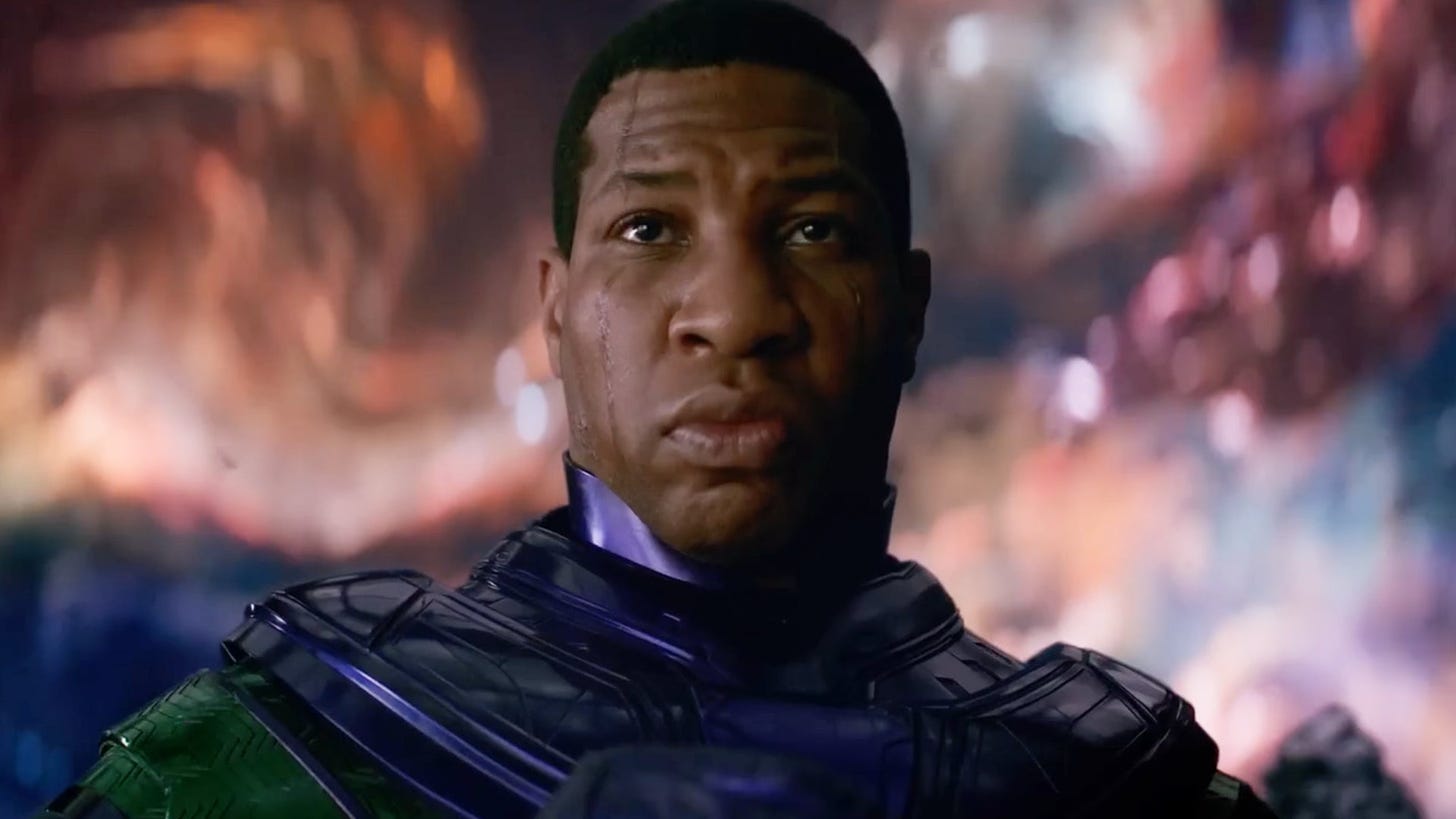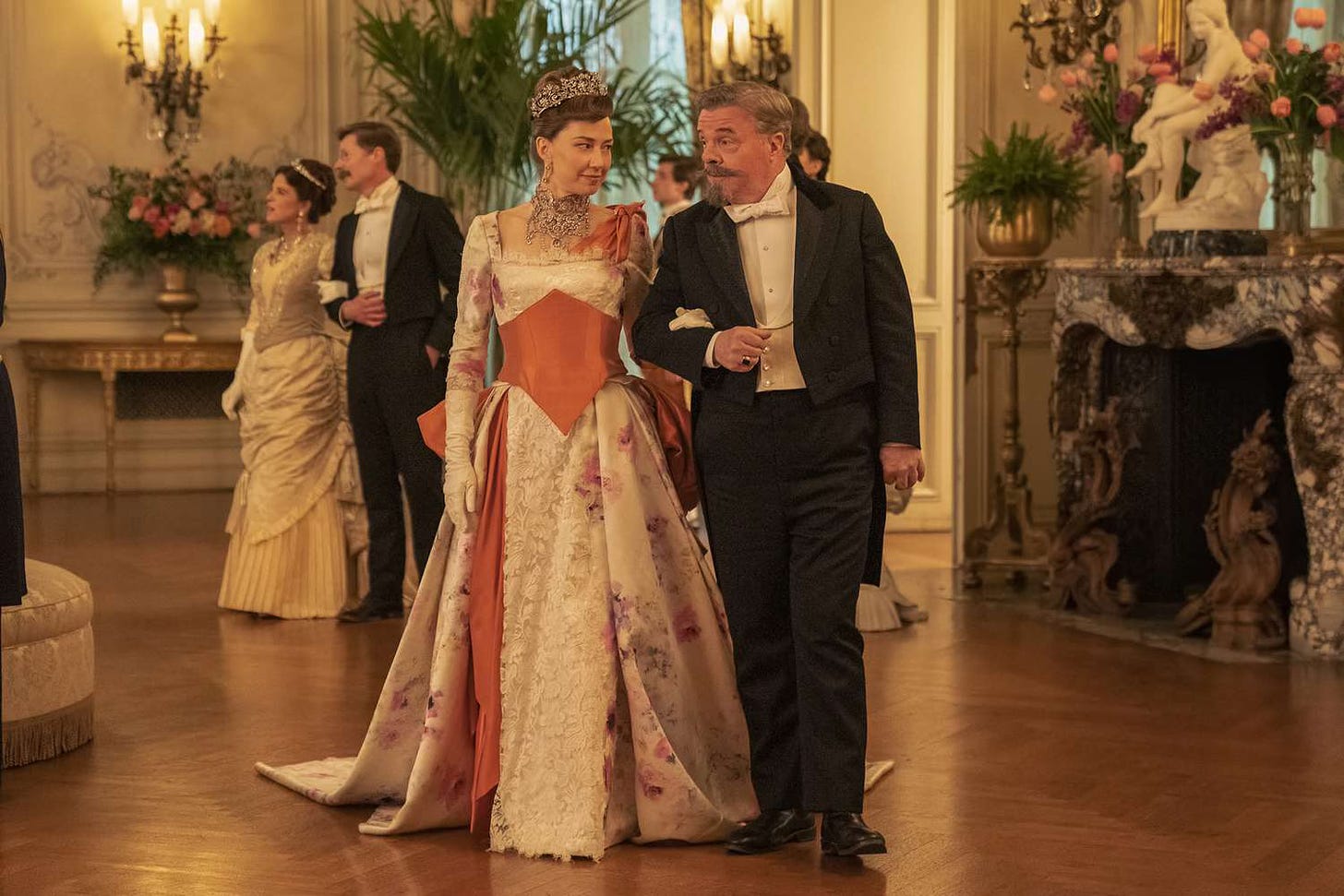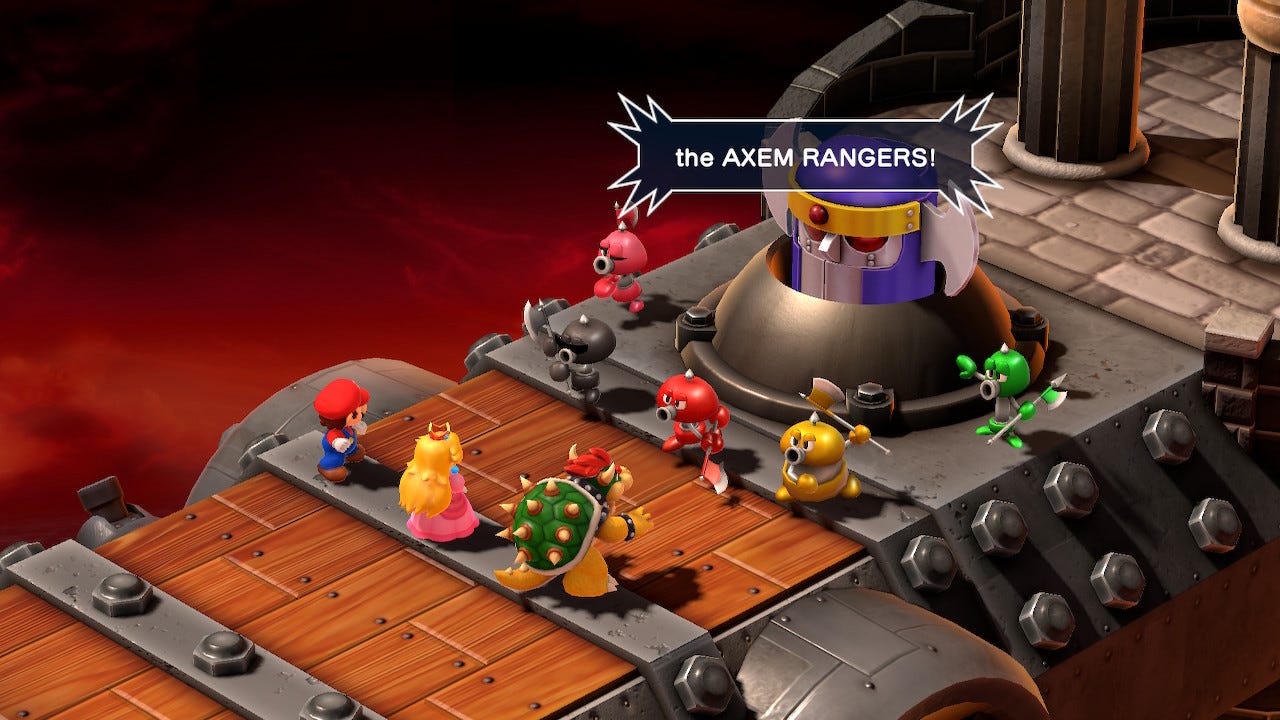Why Did Marvel Stick with Jonathan Majors for So Long?
There's due process and then there's process that's overdue.
Yesterday, actor Jonathan Majors was found guilty of reckless assault in the third degree and guilty of harassment. He was charged back in late March, shortly after it seemed like he would be one of the biggest actors of the year with acclaimed performances in Creed III, the Sundance movie Magazine Dreams (which has now been shelved), and as Marvel’s big villain, Kang the Conquerer, in Ant-Man and the Wasp: Quantumania. Not long after Majors’ arrest, he was dropped by his management company and his PR firm. However, it took until the guilty verdict was announced for Marvel to wash its hands of Majors.
The most charitable read you could give Disney/Marvel in this situation is that they wanted to let the legal process play out. You might even argue, as one of my followers did on Bluesky, that Marvel was legally bound to keep Majors due to a contractual obligation that could only be severed by a guilty verdict. But these arguments don’t hold a lot of water with me.
Majors, like all people, is entitled to due process. But you do not have due process to keeping your job if what you’re accused of is unrelated to your employment. Marvel could have simply issued a statement saying that Majors’ legal entanglements were causing a distraction, and they could no longer continue their relationship with him.

Marvel was already having a bad year. Quantumania was not the sensation the studio hoped for, and yet they continued to pin their future plans to Majors by announcing that Avengers 5 would be titled “The Kang Dynasty.” The best time for Marvel to drop Majors was when he lost his representation. It would have been a noteworthy blow, but there’s strength in numbers, and Marvel could have simply been part of a pattern. Instead, they stayed silent.
Perhaps they didn’t want to say anything because it was March and Loki: Season 2 was due out in October. Perhaps there wasn’t enough time to recast the role, or they felt that recasting the role was too distracting since (minor spoilers ahead), Loki confronts He Who Remains, who was memorably played by Majors in Season 1, and it would be odd to see another actor in the role. I admit that’s a stretch (especially since the draw of the show is Tom Hiddleston, not Jonathan Majors), but production timelines being what they are, perhaps there was no way to mend this season, so they were stuck with Majors.
But if that’s the case, then why not sever your relationship with Majors after Season 2 finished, but before the trial? Marvel had a solid month (and even a Thanksgiving weekend where they could just bury the news!) to let Majors go, but instead, they waited for the trial.
I also find it difficult to believe that Marvel, a studio notorious for exercising control, gave Majors—an acclaimed actor but by no means a household name—a contract that was so airtight that they could only fire him if he was found criminally guilty. Particularly when you consider that Armie Hammer was quickly dropped and replaced in such films as Shotgun Wedding and Next Goal Wins in the wake of abuse allegations. This year saw two major Hollywood strikes involving the power studios like to wield over talent, and we’re left to believe that Majors backed Marvel Studios into a corner?
Which leads me to my biggest question: What was Marvel’s best-case-scenario here? If the jury found Majors not guilty, the evidence against him doesn’t simply disappear. The voicemail where he compares himself to Dr. Martin Luther King Jr. and Barack Obama doesn’t vanish from the public consciousness. Also, even with a not guilty verdict, you still have a credible allegation, and that raises the possibility that he believes he can get away with it again. All of this just so you can keep him around to play a villain that audiences do not care about.
This matters not because I’m particularly invested in Jonathan Majors’ career or the Marvel Cinematic Universe, but because of the signal it sends to victims. Marvel implicitly stood by Majors for nine months. They may have downplayed his part in Loki: Season 2, but they also took a wait-and-see approach to a credible pattern of domestic abuse. When Majors’ legal team took to smearing his accuser, Grace Jabbari, as the real attacker and a vengeful ex-girlfriend (aka the DARVO playbook), Marvel stayed silent, thus giving their fans a chance to assign merit to a meritless argument.
It would be nice to give Marvel credit for not rushing to prematurely indict a Black man in a country that consistently rushes to prematurely indict Black men. But to buy that argument, you have to believe that Marvel was so racially sensitive that they tipped into sexism. But even if that’s what happened here, they could have cut ties with Majors during the trial rather than hoping the jury’s verdict would give them cover. But you shouldn’t need “cover” if your true goal is a moral stand for racial equality. I’m more inclined to believe Marvel saw all the support Johnny Depp got in his trial against Amber Heard, and worried about backlash because they were focused not on race, but on fame. Jonathan Majors is more famous than Grace Jabbari, and he has fans. Marvel’s actions indicate that they needed the guilty verdict so they could parry the claim that they weren’t giving Majors due process even though Marvel isn’t a court of law; they’re a company that makes superhero movies.
Marvel may not have given Majors a full-throated endorsement after his arrest, but they didn’t publicly cut ties with him either. Instead, their inaction implied that maybe Majors’ DARVO defense had merit. It gave weight to the cultural lie that women who accuse famous men are only looking for attention or revenge or “are crazy.” This cynical PR maneuver by Marvel sends a message to anyone else that would think of pressing charges against an abusive movie star: “We’re not with you.”
Recommendations
If you’re not already subscribed to The Reveal, you should be! I had no idea there was a made-for-TV remake of It’s a Wonderful Life from Mary’s perspective. Marlo Thomas plays Mary! Orson Welles plays Mr. Potter! I must see this!
What I’m Watching
The second season of The Gilded Age wrapped last Sunday, and I’m torn. On the one hand, there’s a lot the show does right in terms of gorgeous costumes, lavish sets, and characters worth rooting for played by an outstanding cast of actors. On the other hand, I felt that season two was constantly suffering from wounds both inflicted by the network and by Julian Fellowes’ shortcomings as a writer. On the network side, it felt like the writers mapped out this season only to learn later that their episode order had been cut (Season 1 has nine episodes and Season 2 has eight), which led to weird abbreviations in plot lines like Peggy’s search for her lost son and the romance between Ada and Luke. Even the payoff between Marian and Larry, while not unexpected, felt a bit lost in the crush of other stories.
The larger problem with Season 2 was that Fellowes can’t let go of his love for the wealthy, painting them as either benevolent overlords or cartoonish snobs. For an American audience, that can fly with his previous series Downton Abbey (I don’t know how well it plays with Brits, but they made six seasons of it, so it must have done okay). But your show is called “The Gilded Age” not “The Golden Age.” Fellowes tries valiantly to make George and Bertha Russell ruthless yet charming, and he’s blessed with powerhouse actors Morgan Spector and Carrie Coon. But the Russells are not benevolent people. Their success came at the expense of others, and Fellowes can’t bear to show that expense. His ideal show is the second season’s overarching plot of “the opera war” where people battle over who will attend The Academy of Music or the new Metropolitan Opera House. And that level of frivolity is fine, but it’s only one part of a larger picture that Fellowes doesn’t know how to render when confronted with things that actually matter.
That struggle became painfully clear in the climax of the season’s fifth episode, “Close Enough to Touch” where we’re cutting back and forth between two scenes: In one scene, Bertha is hosting a dinner for the Duke of Buckingham, but her enemy, Mrs. Winterton, has tainted the soup as an act of revenge! The dinner shall be ruined! In the other scene, Peggy and Mr. Fortune, two Black characters reporting on the Tuskegee Institute, are trying not to breathe too loudly as they hide in a barn from a lynch mob.
There’s a level of darkness in the show’s setting that Fellowes is clearly uncomfortable with, and he lacks the fortitude to really examine it. This leads to a bizarre compromise where he includes the South’s history of lynching, but fails to acknowledge the dark reality that a mob out for blood would have found other innocent Black people to harm after Peggy and Mr. Fortune escaped. Also, by cross-cutting this scene with Bertha’s dinner, he’s inviting the viewer to equate the drama of the two plot lines. While I’d like to say it’s a satiric juxtaposition to show the frivolity of Bertha’s goals, that can’t be what Fellowes intended—because he’s made those goals the center plot line of the show. We have to care what the Duke of Buckingham does because it aligns with Bertha’s social standing, but when you place it next to two Black people hiding from a lynch mob, it no longer matters—and it’s tough to reassert that it does when you’ve shown us a horror far more terrifying than serving bad soup to a member of the British aristocracy.
While I would still come back for a third season because I think the characters are strong enough to warrant it (especially within the confines of Fellowes’ areas of comfort), the second season also showed his limitations, and I have to accept that Fellowes is never going to grow beyond them.
What I’m Reading
I finally finished Shirley Jackson’s book of short stories, and it’s easy to see why she’s a legend. The book wasn’t an easy read (and made slightly more difficult by the Kindle edition having weird line breaks throughout) because she’s so good at capturing society’s casual cruelty. What you see in not only in her famous tale “The Lottery” but also other stories is how people behave horribly, but they can’t even see their own cruelty because they’re conditioned to the prevailing attitudes of American society. “The Lottery” may be a heightened reality, but it’s operating on the same wavelength as “Flower Garden,” a story about ostracizing a newcomer because they deign to treat Black people as equals.
Anyway, I needed something much lighter after all that, so it’s back to Ultimate Spider-Man.
What I’m Hearing
I know I recommend If Books Could Kill a lot, but I was astounded by this latest episode on Yascha Mounk’s The Identity Trap. Mounk wants to bill himself as a centrist, and his publicity tour for the book involved repeatedly relating his bevy of anecdotes. However, not every interviewer has time to read a subject’s book, and certainly not to fact-check it. But that’s where IBCK comes in, and I was taken aback at the depths of Mounk’s mendacity. The most charitable read you could give Mounk is that he’s an incredibly sloppy researcher who only took anecdotes that served his thesis, but co-host Michael Hobbes shows there are sections where Mounk took quotes out of context to use them in the exact opposite intended meaning. Even setting aside the ridiculousness of Mounk’s central argument (democracy is unraveling because of “identity politics” where “identity” means anyone not like Mounk); this is the kind of sloppy journalism that would get you tossed from a publication. But in the publishing arena, it can flourish unencumbered by facts.
What I’m Playing
Nothing at the moment! I finally finished the Nintendo Switch remake of Super Mario RPG, which I’ll admit is basically “Baby’s First RPG.” That’s not to say it’s bad, but it’s simple. The combat is basic, the story is straightforward (although certainly weird by Mario standards), and if you’ve played even slightly more advanced games, you can’t escape how little there is to do here in terms of character customization or play style. Again, none of that makes it bad, but it did remind me that the last time I played it was on the Super Nintendo in 1996. Also, I forgot that there’s a Power Rangers parody in it.
Oh, and when you level up, the characters dance! All RPGs should adopt this.







I have a feeling that Majors was unofficially out a long time ago, the problem being that Marvel fans are insane about production news. Publicly dropping Majors meant that every single one of those fans would be baying for news of the new Kang--and Marvel would have to commit to a sinking storyline or risk even more "Marvel in shambles" headlines. Leaving it until the trial ended gave them time to plan.